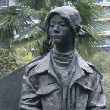
mustn't have done和can't have done的区别最好有例子
9个回答
2018-07-28 · 知道合伙人教育行家
关注
![]()

展开全部
首先have done表示已经做过,这点就不用谈了.
can't have done 表示以前不可能做某事.
例句
---Where____Margaret have put the empty bottles?
---She________them away.They must be somewhere.
A.can;can't have thrown
B.must;must have thrown.
C.must;needn't
D.can;must throw
答案为A.第一个句子是一个疑问句而且表示可能性的推测,所以只能用情态动词can或could,第二句的答语表示对过去的推测,所以用can't have done.
请看常见的“情态动词 + have + 过去分词”的用法:
一、“must + have + 过去分词”表示对过去发生的事情或状态进行推测,语气比较坚定,通常只用于肯定句.如:
It must have rained last night,for the ground is wet.
You must have been mad to speak to the servant.
二、“can / could + have + 过去分词”表示对过去某种情况的怀疑或不确定.can和could一般用于否定句和疑问句,could的语气较can弱.如:
I didn't see her at the meeting this morning; she can't / couldn't have spoken at the meeting.
He can't have finished the work so soon.
三、“may / might + have + 过去分词”表示对已发生的动作或存在的状态进行不肯定的推测,might的语气比may弱一点.这种结构主要用于肯定句和否定句,疑问句改用can或could.如:
They may not have known it beforehand.
You might have read about it in the papers.
四、“need + have + 过去分词”表示过去做了不必做或不需要做的事情,或过去做某事纯属多余.如:
Need they have done it last week?
I needn't have bought so much wine—only five people came.
五、“should / ought to + have + 过去分词”表示过去本该做某事但没做,其否定式表示过去不该做某事但做了,这种句式含有不满或责备之意,ought to的语气比should强一些.如:
You ought to / should have studied harder.你本应该更努力学习的.(但没有)
He oughtn't to / shouldn't have done that.他本来就不该做那件事.(可是做了)
六、“would + have + 过去分词”表示对过去的某种情况进行猜测,或本来要做某事却因某种原因未做成,通常用来说明某一情况,但不像用should或ought to那样含有责备之意.如:
I guess the poet would have been about twenty when she wrote her first poem.
Another worker wouldn't have acted like that.
can't have done 表示以前不可能做某事.
例句
---Where____Margaret have put the empty bottles?
---She________them away.They must be somewhere.
A.can;can't have thrown
B.must;must have thrown.
C.must;needn't
D.can;must throw
答案为A.第一个句子是一个疑问句而且表示可能性的推测,所以只能用情态动词can或could,第二句的答语表示对过去的推测,所以用can't have done.
请看常见的“情态动词 + have + 过去分词”的用法:
一、“must + have + 过去分词”表示对过去发生的事情或状态进行推测,语气比较坚定,通常只用于肯定句.如:
It must have rained last night,for the ground is wet.
You must have been mad to speak to the servant.
二、“can / could + have + 过去分词”表示对过去某种情况的怀疑或不确定.can和could一般用于否定句和疑问句,could的语气较can弱.如:
I didn't see her at the meeting this morning; she can't / couldn't have spoken at the meeting.
He can't have finished the work so soon.
三、“may / might + have + 过去分词”表示对已发生的动作或存在的状态进行不肯定的推测,might的语气比may弱一点.这种结构主要用于肯定句和否定句,疑问句改用can或could.如:
They may not have known it beforehand.
You might have read about it in the papers.
四、“need + have + 过去分词”表示过去做了不必做或不需要做的事情,或过去做某事纯属多余.如:
Need they have done it last week?
I needn't have bought so much wine—only five people came.
五、“should / ought to + have + 过去分词”表示过去本该做某事但没做,其否定式表示过去不该做某事但做了,这种句式含有不满或责备之意,ought to的语气比should强一些.如:
You ought to / should have studied harder.你本应该更努力学习的.(但没有)
He oughtn't to / shouldn't have done that.他本来就不该做那件事.(可是做了)
六、“would + have + 过去分词”表示对过去的某种情况进行猜测,或本来要做某事却因某种原因未做成,通常用来说明某一情况,但不像用should或ought to那样含有责备之意.如:
I guess the poet would have been about twenty when she wrote her first poem.
Another worker wouldn't have acted like that.
2016-08-22 · 知道合伙人教育行家
 wangpanyong110
wangpanyong110
知道合伙人教育行家
采纳数:35719
获赞数:363477
毕业于河南大学地理专业,学士学位;从教23年,读过地理专著和教育学专著,现任中学教师。
向TA提问 私信TA
关注
![]()

展开全部
首先have done表示已经做过,这点就不用谈了.
can't have done 表示以前不可能做某事.
例句
---Where____Margaret have put the empty bottles?
---She________them away.They must be somewhere.
A.can;can't have thrown
B.must;must have thrown.
C.must;needn't
D.can;must throw
答案为A.第一个句子是一个疑问句而且表示可能性的推测,所以只能用情态动词can或could,第二句的答语表示对过去的推测,所以用can't have done.
请看常见的“情态动词 + have + 过去分词”的用法:
一、“must + have + 过去分词”表示对过去发生的事情或状态进行推测,语气比较坚定,通常只用于肯定句.如:
It must have rained last night,for the ground is wet.
You must have been mad to speak to the servant.
二、“can / could + have + 过去分词”表示对过去某种情况的怀疑或不确定.can和could一般用于否定句和疑问句,could的语气较can弱.如:
I didn't see her at the meeting this morning; she can't / couldn't have spoken at the meeting.
He can't have finished the work so soon.
三、“may / might + have + 过去分词”表示对已发生的动作或存在的状态进行不肯定的推测,might的语气比may弱一点.这种结构主要用于肯定句和否定句,疑问句改用can或could.如:
They may not have known it beforehand.
You might have read about it in the papers.
四、“need + have + 过去分词”表示过去做了不必做或不需要做的事情,或过去做某事纯属多余.如:
Need they have done it last week?
I needn't have bought so much wine—only five people came.
五、“should / ought to + have + 过去分词”表示过去本该做某事但没做,其否定式表示过去不该做某事但做了,这种句式含有不满或责备之意,ought to的语气比should强一些.如:
You ought to / should have studied harder.你本应该更努力学习的.(但没有)
He oughtn't to / shouldn't have done that.他本来就不该做那件事.(可是做了)
六、“would + have + 过去分词”表示对过去的某种情况进行猜测,或本来要做某事却因某种原因未做成,通常用来说明某一情况,但不像用should或ought to那样含有责备之意.如:
I guess the poet would have been about twenty when she wrote her first poem.
Another worker wouldn't have acted like that.
can't have done 表示以前不可能做某事.
例句
---Where____Margaret have put the empty bottles?
---She________them away.They must be somewhere.
A.can;can't have thrown
B.must;must have thrown.
C.must;needn't
D.can;must throw
答案为A.第一个句子是一个疑问句而且表示可能性的推测,所以只能用情态动词can或could,第二句的答语表示对过去的推测,所以用can't have done.
请看常见的“情态动词 + have + 过去分词”的用法:
一、“must + have + 过去分词”表示对过去发生的事情或状态进行推测,语气比较坚定,通常只用于肯定句.如:
It must have rained last night,for the ground is wet.
You must have been mad to speak to the servant.
二、“can / could + have + 过去分词”表示对过去某种情况的怀疑或不确定.can和could一般用于否定句和疑问句,could的语气较can弱.如:
I didn't see her at the meeting this morning; she can't / couldn't have spoken at the meeting.
He can't have finished the work so soon.
三、“may / might + have + 过去分词”表示对已发生的动作或存在的状态进行不肯定的推测,might的语气比may弱一点.这种结构主要用于肯定句和否定句,疑问句改用can或could.如:
They may not have known it beforehand.
You might have read about it in the papers.
四、“need + have + 过去分词”表示过去做了不必做或不需要做的事情,或过去做某事纯属多余.如:
Need they have done it last week?
I needn't have bought so much wine—only five people came.
五、“should / ought to + have + 过去分词”表示过去本该做某事但没做,其否定式表示过去不该做某事但做了,这种句式含有不满或责备之意,ought to的语气比should强一些.如:
You ought to / should have studied harder.你本应该更努力学习的.(但没有)
He oughtn't to / shouldn't have done that.他本来就不该做那件事.(可是做了)
六、“would + have + 过去分词”表示对过去的某种情况进行猜测,或本来要做某事却因某种原因未做成,通常用来说明某一情况,但不像用should或ought to那样含有责备之意.如:
I guess the poet would have been about twenty when she wrote her first poem.
Another worker wouldn't have acted like that.
已赞过
已踩过<
评论
收起
你对这个回答的评价是?
展开全部
mustn't have done: 虽然是推测,但跟事实是一样的,即“一定没有做完某事,以至于对现在还有影响”;
He mustn't have done this project. 他必定没有完成这项工程。
但是一般不这样用,而是通常用于反义疑问句,如:
He must have done this project, hasn't he?
他一定已经完成这项工程
can't have done:
(1) 其实,是must have done 的否定形式!也就是说,通常不说 mustn't ...
(2) 表示推测,比较肯定,是说话人根据对某人某事平常的了解,不可能发生。He can't have done that for he is not that kind of man. 跟读
他不可能这么做的,因为他不是那种人。
He mustn't have done this project. 他必定没有完成这项工程。
但是一般不这样用,而是通常用于反义疑问句,如:
He must have done this project, hasn't he?
他一定已经完成这项工程
can't have done:
(1) 其实,是must have done 的否定形式!也就是说,通常不说 mustn't ...
(2) 表示推测,比较肯定,是说话人根据对某人某事平常的了解,不可能发生。He can't have done that for he is not that kind of man. 跟读
他不可能这么做的,因为他不是那种人。
已赞过
已踩过<
评论
收起
你对这个回答的评价是?
展开全部
“can't+have+done”表示对过去事情的否定推测,译成“不可能做过某事”。
Mr. Smith can't have gone to Beijing, for I saw him in the library justnow.
史密斯先生不可能去北京了,我刚才还在图书馆见过他。
Mary can't have stolen your money. She has gone home.
玛丽不可能偷你的钱,她回家去了。
“mustn't have done”没有这种搭配,这是一定要记住的!
只有mustn't do sth. 指的是明令禁止做某事
本回答被提问者和网友采纳
已赞过
已踩过<
评论
收起
你对这个回答的评价是?
展开全部
首先have done表示已经做过,这点就不用谈了.
can't have done 表示以前不可能做某事.
例句
---Where____Margaret have put the empty bottles?
---She________them away.They must be somewhere.
A.can;can't have thrown
B.must;must have thrown.
C.must;needn't
D.can;must throw
答案为A.第一个句子是一个疑问句而且表示可能性的推测,所以只能用情态动词can或could,第二句的答语表示对过去的推测,所以用can't have done.
请看常见的“情态动词 + have + 过去分词”的用法:
一、“must + have + 过去分词”表示对过去发生的事情或状态进行推测,语气比较坚定,通常只用于肯定句.如:
It must have rained last night,for the ground is wet.
You must have been mad to speak to the servant.
二、“can / could + have + 过去分词”表示对过去某种情况的怀疑或不确定.can和could一般用于否定句和疑问句,could的语气较can弱.如:
I didn't see her at the meeting this morning; she can't / couldn't have spoken at the meeting.
He can't have finished the work so soon.
三、“may / might + have + 过去分词”表示对已发生的动作或存在的状态进行不肯定的推测,might的语气比may弱一点.这种结构主要用于肯定句和否定句,疑问句改用can或could.如:
They may not have known it beforehand.
You might have read about it in the papers.
四、“need + have + 过去分词”表示过去做了不必做或不需要做的事情,或过去做某事纯属多余.如:
Need they have done it last week?
I needn't have bought so much wine—only five people came.
五、“should / ought to + have + 过去分词”表示过去本该做某事但没做,其否定式表示过去不该做某事但做了,这种句式含有不满或责备之意,ought to的语气比should强一些.如:
You ought to / should have studied harder.你本应该更努力学习的.(但没有)
He oughtn't to / shouldn't have done that.他本来就不该做那件事.(可是做了)
六、“would + have + 过去分词”表示对过去的某种情况进行猜测,或本来要做某事却因某种原因未做成,通常用来说明某一情况,但不像用should或ought to那样含有责备之意.如:
I guess the poet would have been about twenty when she wrote her first poem.
Another worker wouldn't have acted like that.
can't have done 表示以前不可能做某事.
例句
---Where____Margaret have put the empty bottles?
---She________them away.They must be somewhere.
A.can;can't have thrown
B.must;must have thrown.
C.must;needn't
D.can;must throw
答案为A.第一个句子是一个疑问句而且表示可能性的推测,所以只能用情态动词can或could,第二句的答语表示对过去的推测,所以用can't have done.
请看常见的“情态动词 + have + 过去分词”的用法:
一、“must + have + 过去分词”表示对过去发生的事情或状态进行推测,语气比较坚定,通常只用于肯定句.如:
It must have rained last night,for the ground is wet.
You must have been mad to speak to the servant.
二、“can / could + have + 过去分词”表示对过去某种情况的怀疑或不确定.can和could一般用于否定句和疑问句,could的语气较can弱.如:
I didn't see her at the meeting this morning; she can't / couldn't have spoken at the meeting.
He can't have finished the work so soon.
三、“may / might + have + 过去分词”表示对已发生的动作或存在的状态进行不肯定的推测,might的语气比may弱一点.这种结构主要用于肯定句和否定句,疑问句改用can或could.如:
They may not have known it beforehand.
You might have read about it in the papers.
四、“need + have + 过去分词”表示过去做了不必做或不需要做的事情,或过去做某事纯属多余.如:
Need they have done it last week?
I needn't have bought so much wine—only five people came.
五、“should / ought to + have + 过去分词”表示过去本该做某事但没做,其否定式表示过去不该做某事但做了,这种句式含有不满或责备之意,ought to的语气比should强一些.如:
You ought to / should have studied harder.你本应该更努力学习的.(但没有)
He oughtn't to / shouldn't have done that.他本来就不该做那件事.(可是做了)
六、“would + have + 过去分词”表示对过去的某种情况进行猜测,或本来要做某事却因某种原因未做成,通常用来说明某一情况,但不像用should或ought to那样含有责备之意.如:
I guess the poet would have been about twenty when she wrote her first poem.
Another worker wouldn't have acted like that.
已赞过
已踩过<
评论
收起
你对这个回答的评价是?
更多回答(7)
推荐律师服务:
若未解决您的问题,请您详细描述您的问题,通过百度律临进行免费专业咨询


